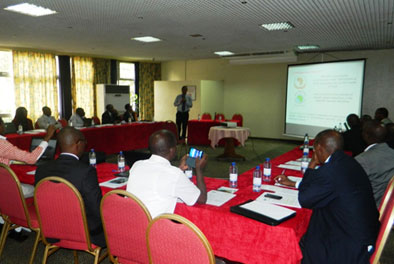Organized by GWP Eastern Africa, in collaboration with Rwanda Water Partnership, the National Workshop on Integration of Water Security and Climate Resilience is taking place in Kigali, Rwanda, December 17th 2013.
Kabarisa, Jean Paul Vincent, Deputy Director General for the Integrated Water Resources Management from Rwanda’s Ministry of Natural Resources commended the registered progress of Water, Climate Development Program (WACDEP).
WACDEP is Africa’s program developed to address issues of climate change and water security in Africa especially eight countries. In Eastern Africa, the program is implemented inBugesera region specifically around Rwanda-Burundi trans-boundary lake Cyohoha.
Historically, Bugeseraregion was vulnerable to severe drought, water scarcity resulting into food insecurity and constant citizen movements for food and water.
Citing government’s efforts towards responding to erotic disasters: prolonged drought and floods, the Deputy Director General urged for more linkages between WACDEP activities to existing gaps in areas of national drought and flood managements in Bugesera region.
Kamabuye Sector Executive Secretary, Jean de Muyengeza briefed participants about how far citizens are engaged in WACDEP activity implementation process and the level of ownership by local governance system.
“Citizens were the ones who identified key needs. To them, access to water and energy were cited as key priorities. WACDEP based on its activities on these needs,” Executive Secretary of Kamabuye said.
The study on Integration of Water Security and Climate Resilience noted increasing political will, institutional, policy and strategy frameworks as some of the commendable strengths.
“Rwanda as a water-scarce country has stepped-up its investments in efficiency, productive, equitable and sustainable management of its water resources,” the report underscored.
However, technical capacity were cited as potential gaps that could affect sufficient and effective policy implementation in areas of water security and climate resilience.
The report recommended a smoother and smarter coordination mechanism for the implementation of water and climate resilience policies, programs and plans.
The Regional Coordinator of GWP Eastern Africa, Safari Patrick commended the inputs from participants drawn from different institutions with climate resilience and water security in their attributions.
Safari Patrick suggested Sector Wide Approach (SWAP) as one of the solution best fitting to address institutional coordination gaps in Rwanda.
In her closing remarks, ColethaRuhamnya, Deputy Director General for Rwanda Environment Management Authority commended the consultative and knowledge sharing process. She urged for more interactive sessions to share and learn from the existing best practices in water and climate resilience sector.
Present to the National Workshop included senior officers from the Ministries of Natural Resources, Ministry of Agriculture, Ministry of Infrastructure, Implementing Agencies such as Rwanda Environment Authority, Rwanda Natural Resources Authority, Rwanda MetrologicalAgency.
